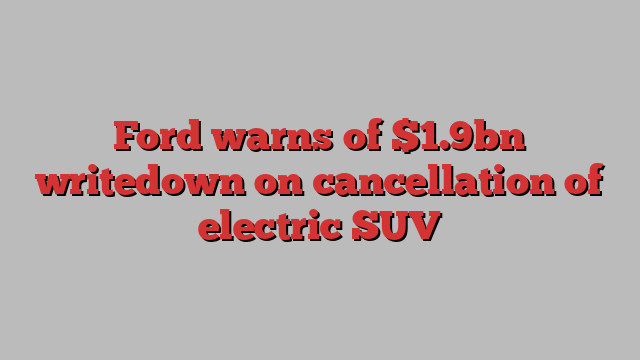
Unlock the Editor’s Digest for free
Roula Khalaf, Editor of the FT, selects her favourite stories in this weekly newsletter.
Ford is cancelling plans to manufacture a three-row electric sport utility vehicle, potentially costing the company up to $1.9bn, swapping it for a hybrid version as car buyers demonstrate a slowness to embrace expensive EVs.
The US carmaker said on Wednesday the electric SUV would not be able to turn a profit within a year of launch, due to a crowded market segment and mainstream consumers’ reluctance to pay higher prices for EVs.
“These vehicles need to be profitable, and if they’re not profitable based on where the customer is and the market is, we will . . . make those tough decisions,” said chief financial officer John Lawler.
The company also said it would reduce the percentage of its annual capital expenditure going towards purely electric vehicles from 40 per cent to 30 per cent.
Ford’s decisions come as the pace of EV adoption has slowed among consumers who, unlike the first wave of EV buyers, are more discouraged by high prices and insufficient public charging infrastructure. Manufacturers including Tesla and Ford have cut prices, and Ford chief executive Jim Farley has publicly worried about competition from lower-priced EVs being churned out by Chinese carmakers, even though they have yet to hit the US market.
Ford also is dealing with investors who were disappointed by unexpectedly high warranty costs during the second quarter that caused the company to miss Wall Street’s expectations. The company’s stock has fallen about one-fifth since then, but shares were up 2 per cent on Wednesday to $10.90.
The carmaker will manufacture the three-row SUV as a hybrid instead, as the auto industry continues to re-evaluate a technology many in it had dismissed. Because batteries account for so much of the cost of an electric vehicle, “when you can take down the battery size . . . the profit profile is better”, Ford chief communications officer Mark Truby said.
Ford will take a $400mn writedown for assets tied to manufacturing that are already on its books, Lawler said. It could log another $1.5bn in charges in future quarters for assets that it has yet to receive but which are tied to the three-row electric SUV.
The company also said it “realigned” its battery sourcing to better qualify for tax credits in the Inflation Reduction Act targeted at both consumers and manufacturers.
Ford’s plans “make sense”, said Bernstein analyst Daniel Roeska. But “the criticism Ford will have to face is why its product plan was not more flexible from the beginning, why it has been slow to implement these changes, and why investors will need to wait for a comprehensive update until next year”.